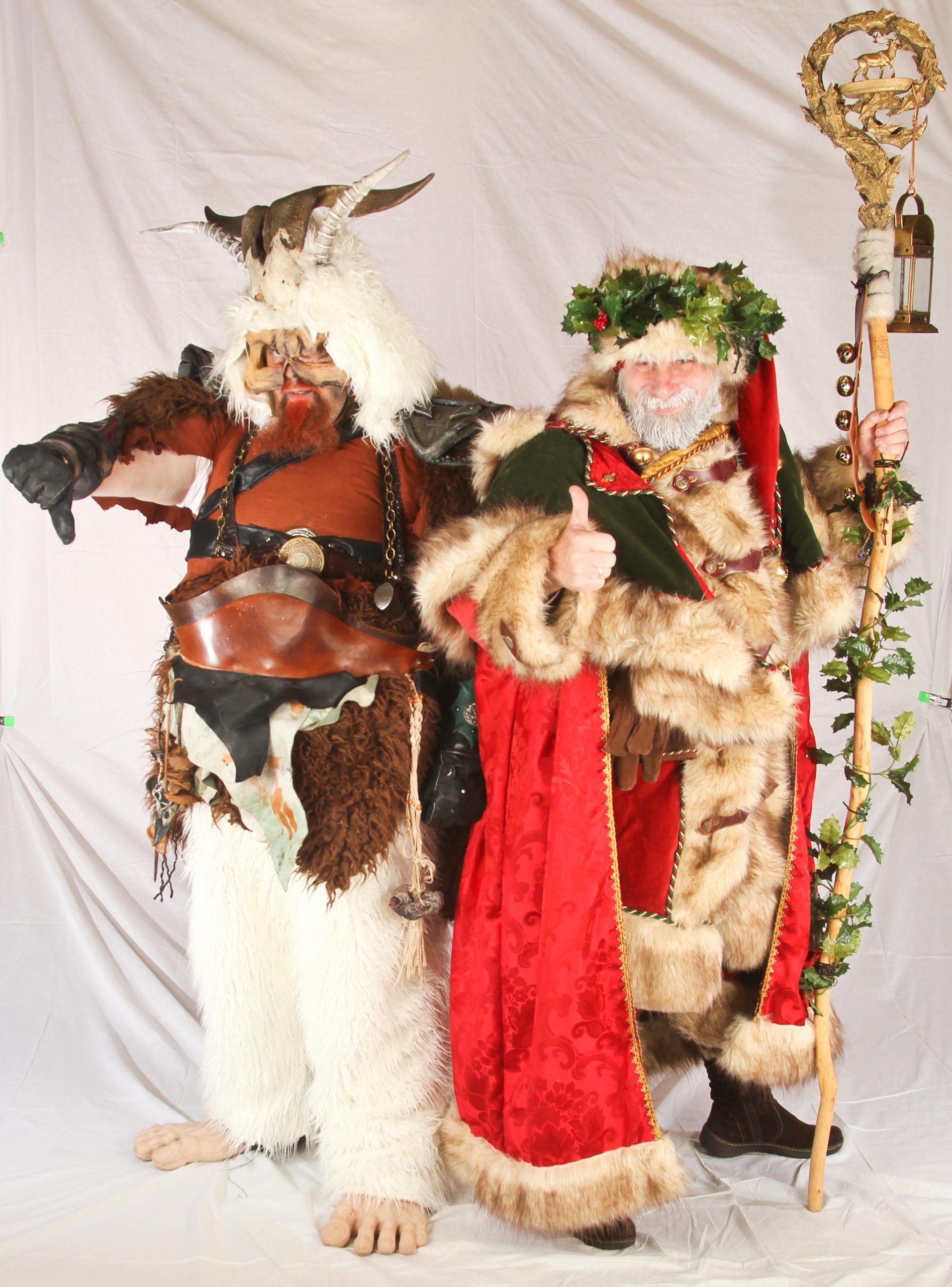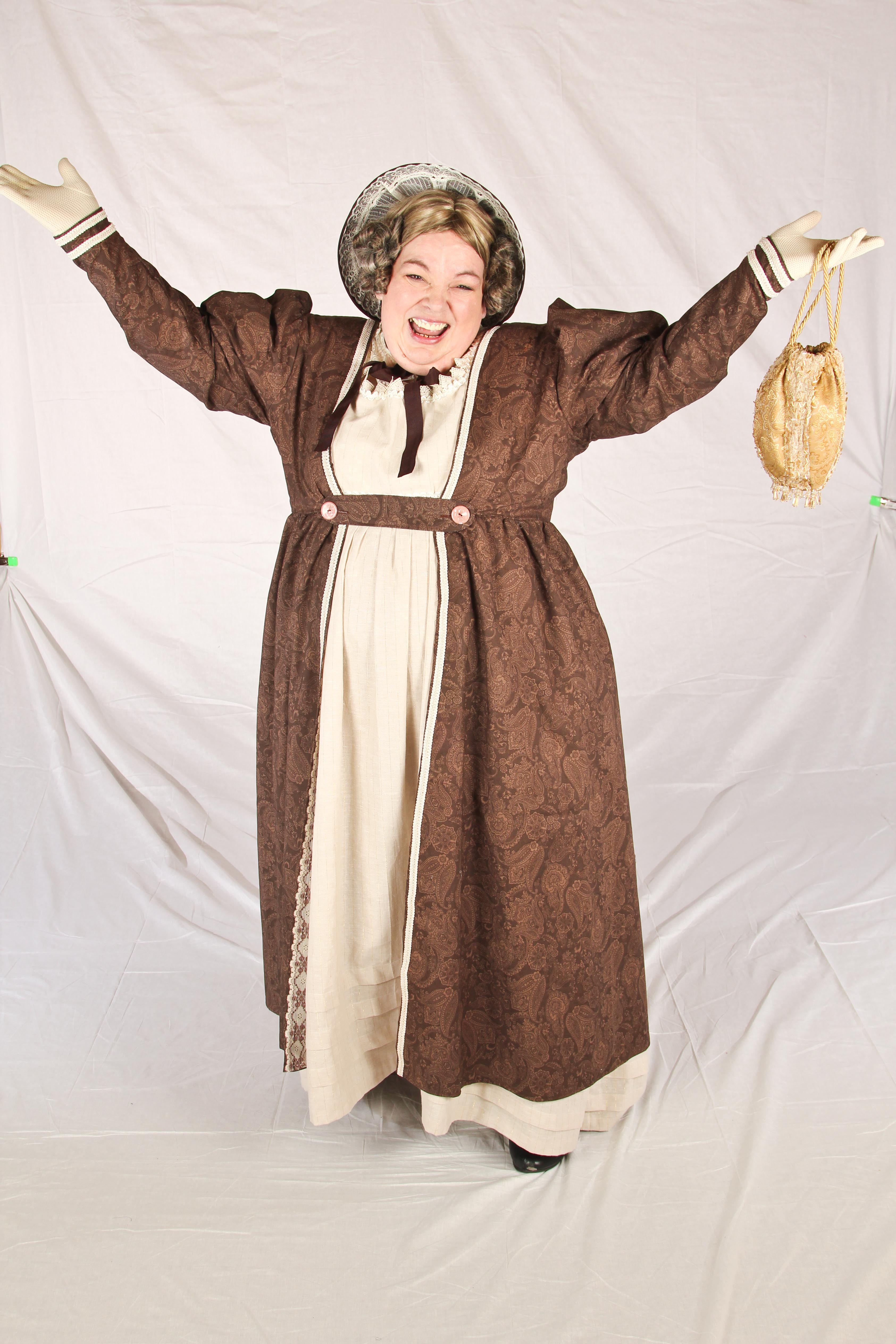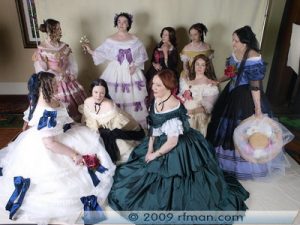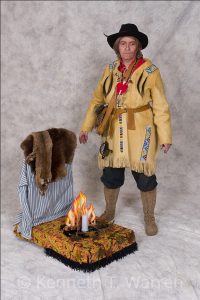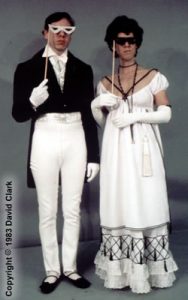CC31-H-12c: Mrs. Musgrove
Competition Staff & Rules
Staff:
- Director: Aurora Celeste
- Master of Ceremonies: James Nimark
- Presentation Judges: Gypsy Ames, Nora Mai and Pierre E. Pettinger, Jr.
- Judges’ Clerk: Unknown
Rules:
Historical costumes are evaluated both on construction and from the audience as presented. Entries can be categorized as Recreation, where precise historical techniques and faithful reproduction are valued, or Interpretation, where a period design or garment may just be a jumping-off point. In both categories, a short summary of the entrant’s supporting research (documentation) is important.
Historical Masquerade Director: Aurora Celeste
Historical Masquerade Rules
The Historic Masquerade will limit entries to costumes based on clothing that was worn, or could have been worn, 5 years or more than 5 years prior to the birth of the entrant or, in the case of a group, 5 years or more than 5 years prior to the birth of the oldest group member. For example, a person born in 1975 could do a costume from 1970 or any date prior to that, but not from 1972. You must be an attending member of Costume-Con 31 to compete in the Historic Masquerade, as must any models you may use.
- All entries must register before 6:00 P.M., Friday, May 17, 2013. Documentation is also due by this time. You may pre-register. A form will be available on the convention website closer to the convention weekend. If you pre-register, you must turn in your documentation by the above deadline.
- The Historic Masquerade will follow the International Costumers’ Guild Guidelines for International Level Masquerades and Competitions.
- Categories: All categories are eligible for Best in Class and Best in Show. The Historic Masquerade will use the following categories:
- Historic Reproduction: This category is for costumes that are based on a specific, existing costume, painting, description, or illustration. The goal of a Historic Reproduction is to re-make a costume that existed in the historical time period.
- Historic Dress: This category is for entries who are attempting to look like they came from the time and place they are creating, costumes that never did exist but could have based on the research of the maker. These costumes are original in design, but must adhere to period characteristics of fabric, color, fabrication and style.
- Historic Interpretation: This category is for those costumes based on a Historic period and place, but which intentionally, visibly and obviously departs from it. If the judges have to ask you why your costume is an interpretation, it probably belongs in Historic Dress.
- Ethnic Costume: A costume in this category may be from any time period, including the present. (Yes, this is the exception to Rule number 1.)
- Skill Divisions: The Costume-Con 31 Historic Masquerade will use Skill Divisions to assure fairness to all entrants. We will use the following Skill Divisions:
- Young Fan: This level is limited to entrants 12 years of age or younger. It will be divided between those costumes built by the young fans themselves and those built by an adult that the young fan presents.
- Novice: The Novice level is for beginning costumers. You may not enter in the Novice level if you:
- Have won three awards in the Novice division in a Costume-Con Historic Masquerade;
- Have won Best in Class in the Novice division or Best in Show at a Costume-Con Historic Masquerade;
- Have won any award (including Honorable Mention) while competing in a division higher than Novice in a Costume-Con Historic Masquerade;
- Compete in the Master division in the Fantasy and Science Fiction Masquerade at Costume-Cons or Worldcons (World Science Fiction Convention);
- Possess a Costume Laurel in the Society for Creative Anachronism or a similar accolade in an equivalent organization;
- Are a Professional in the Costuming Field. Professional is defined as someone who earns a majority of his or her income from fashion or costume, including college or university faculty members.
- Journeyman: The Journeyman level is an intermediate division for those who are no longer Novices, but are still honing their costuming skills. You may not enter at the Journeyman level if you:
- Have won three awards at the Journeyman level at Costume-Con Historical Masquerades;
- Have won Best in Class in the Journeyman division or Best in Show at a Costume-Con Historic Masquerade;
- Have won an award at the Master level in either a Costume-Con or Worldcon masquerade (either Historical or Fantasy and Science Fiction);
- Possess a Costume Laurel in the Society for Creative Anachronism or a similar accolade in an equivalent organization;
- Are a professional in the Historic costuming field (professional as defined above).
- Master: The Master level is an open level. Anyone may enter and compete at this level if they wish. You must enter at this level if you are not eligible to enter as a Young Fan, Novice or Journeyman. (Note that if you are not required to enter at the Master level and decide to enter at this level and win any award, you must enter at the Master level at all future competitions. If you do not win an award you may enter in your qualifying division at future competitions.)
- Judging: Our judges will evaluate (and issue awards) in three areas: Documentation, Workmanship, and Presentation. Entries will be judged against what the judges see as an award-winning standard. The judges reserve the right to not issue awards in any area or to award a Best in Class or Best in Show.
- Documentation: All entries require documentation. Documentation must be received at the masquerade registration desk no later than 6:00 PM on Friday of the con. If you are arriving at the con later than this, please contact us well in advance. We will make accommodations for reasonable situations. Documentation may not be submitted as computer disks (CD’s or DVD’s), memory sticks or any type of video, and commercial books cannot be submitted in the whole as part of documentation (photocopy the pertinent pages instead).
- Basic Documentation: The basic requirements for all documentation are:
- Title of Costume
- Name and address of the person responsible for the entry (or the spokesman for a group)
- Name(s) of designer(s) and maker(s)
- Brief identifying description of the costume’s historic period, geographic origin, social class and so forth. This description should include the historic basis for the costume. This basis could be as simple as a single photo, but could be more comprehensive. This would also be the point to notate any substitutions of historically accurate materials used. Always assume the judges are not familiar with your period. The text portion of basic documentation may not exceed 5 pages. Photos do not have a limit.
- Bibliography of sources. The bibliography may be of any length.
- Advanced Documentation: Advanced documentation is not to imply that it is better than Basic Documentation. It is intended to allow the contestant more latitude in their documentation. The characteristics of Advanced Documentation are:
- All the requirements of Basic Documentation above in the first five pages of the text. Judges have to read all documentation between it being handed in on Friday and workmanship judging so they may not have time to read more than the first five pages of documentation text. You can reference further information by citing pages after 5, but make sure the important stuff is in the first five pages!
- Additional text is allowed. This must be clearly separated from the basic text above. The contestant may expound at greater length on the costume’s basis and the choices made. More detailed descriptions of work and technique are also allowed here. Keep in mind that the judges may not have time to read all your text. That is why you must have all the limited basic text in the first five pages.
- Creative and innovative formats. Past entrants have used such things as embellished books, scrolls, maps and even rocks for documentation. Your imagination is the limit.
- Basic Documentation: The basic requirements for all documentation are:
- Workmanship: All contestants must take part in Workmanship judging. This is your opportunity to let the judges admire your work up close. Each entry will meet privately with our judges. Entrants will be expected to show the judges all necessary parts of the costume. Entrants must bring all parts of their costume to the judging on a hanger or otherwise carry it (do not wear it). If you are particularly proud of a particular part of the costume, be sure to bring it to the judge’s attention. Workmanship judging will be limited to 10-15 minutes per person. The exact time will depend on the number of entrants. Entrants will have an opportunity to sign up for workmanship judging appointments when they register or check in at the masquerade desk.
- Stage Presentation: All entrants must appear on stage. This is your opportunity to show your costume to best effect or tell the story you wish to tell. Entrants with 1-4 persons will be allowed no more than 60 seconds to present your costumes. Entries with more than 4 persons will be allowed up to 90 seconds. You will have to convince us if you wish more time. It will not be an easy job to convince us.We strongly recommend that all entrants use music to enhance their presentation. Music must be presented in the format required by Tech (to be posted closer to the competition date). If you wish to have music but can’t find an appropriate piece please inform the Masquerade Director so they can confer with tech and have some potential pieces waiting for you at your Tech Rehersal. Narration or speaking must be pre-recorded or done by the MC, entrants will not be given a microphone.
Additional Rules
- All general rules for the Costume-Con 31 stage apply.
- Individuals may appear in the Historic Masquerade only once. You may enter more than one costume, but it must appear on another body.
- No purchased or rented costumes may compete. If you have an interesting costume you think the audience might enjoy that is purchased you may show it in Exhibition. Exhibition costumes do not require documentation or workmanship judging.
- No nudity unless cleared beforehand with the Masquerade Director. Remember that this is a costume contest not a physical fitness contest and that judges will be concentrating on the quality of the costume not the quality or quantity of skin around it.
- Costumes that have won awards for presentation or workmanship at past Costume-Cons or Worldcons may not appear in competition in Costume-Con 31′s Historic Masquerade. They may appear as Exhibition Costumes.
- No flame, fire, pyrotechnics or messy substances (such as peanut butter) will be allowed on stage.
- Drawn weapons must be approved by the Masquerade Directors.
- Any electrical effects must be self-powered. No power cords will be allowed.
- No live animals will be permitted. (Guide animals excepted)
- Children must be kept under the control of a responsible adult at all times.
- Your costume must be complete when you come to the Green Room. Final assembly of large items is permitted; however the Green Room is for dressing and prepping for stage, not for construction or painting.
- Follow the technical rules for CD’s or other music media.
- You must attend a technical rehearsal prior to going on stage. Rehearsal times will be available at registration/check-in. You must come to your rehearsal ready to go and wearing any portion of your costume needed to practice your movements: large feet, hoop skirts and so forth. (You are not required to wear your entire costume to rehearsal.) You should also bring some swatches of fabric so the lighting crew can help you pick lights (or better bring the costume!).
- Default lighting will be stage dark, rising to full lighting when entry is announced, fading to dark on exit.
- Default music will be start after entry is announced and faded out at exit.
- Following your entry’s exit, any props must be removed from the stage.
- The Green Room is for entrants, roadies and masquerade staff only. Please do not invite family or friends to the Green Room or backstage.
- All entrants must go through Official Photo. This is not optional. Refusal to be photographed is grounds for elimination from the masquerade.
- Surprise the audience, but never the Directors, staff or technical crew. Contact us if you are planning something unusual that may violate any of these rules.
- If you think any of these rules don’t apply to you, you are wrong! Exceptions are possible, but only by approval of the Masquerade and Technical Directors.
- The Masquerade Directors have full authority to eliminate anyone from the competition on the grounds of bad taste, danger to self or to other, violation of the rules or any other reason deemed sufficient. There is no appeal.
